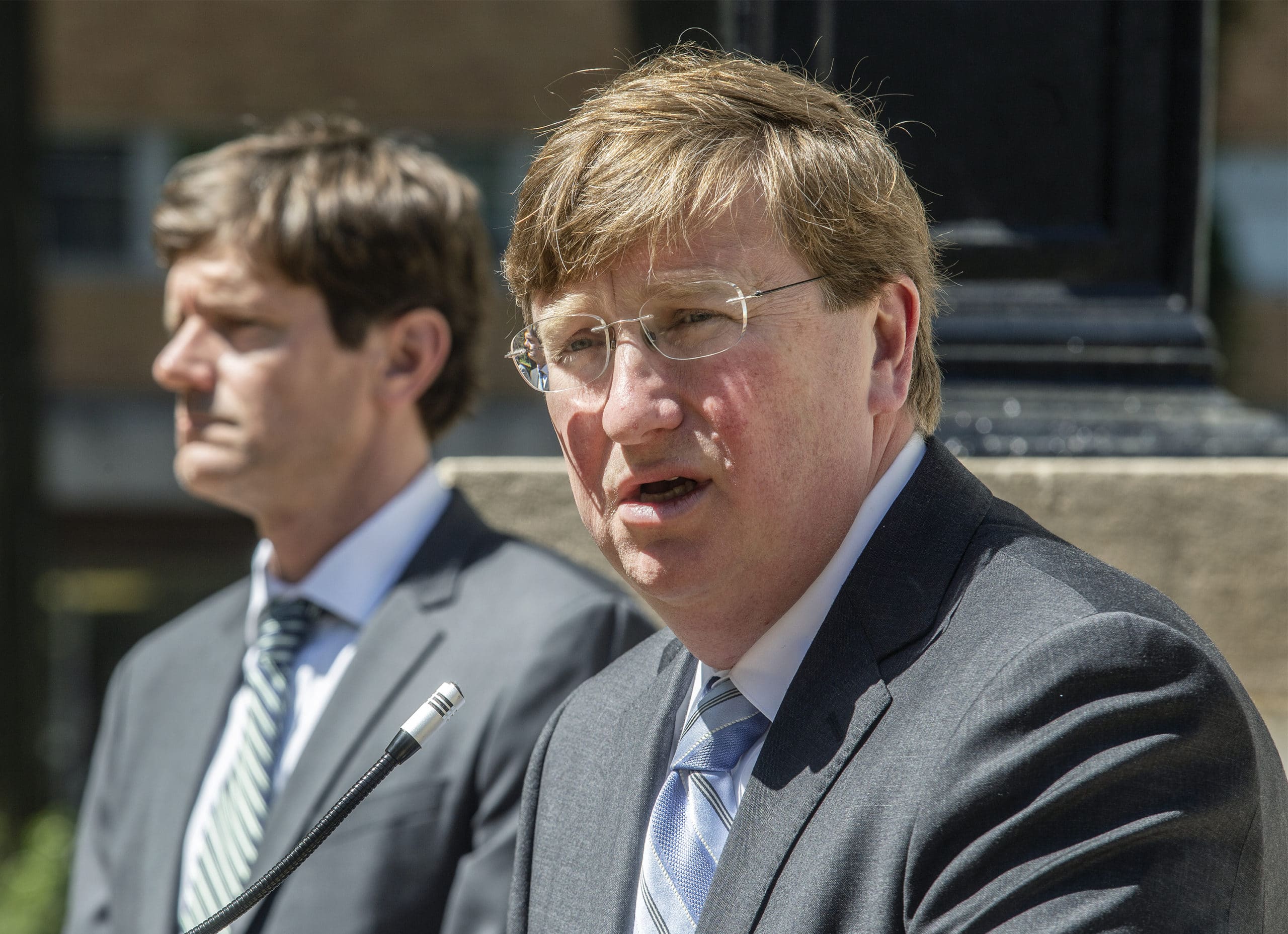Mississippi Today
Fact check: Did Gov. Reeves keep Mississippi ‘open for business’ during pandemic?

To hear Gov. Tate Reeves talk on the reelection trail, one would think that during COVID-19, he was a stalwart champion of individual and business freedom and that Mississippi never locked down or suffered the restrictions other states saw.
“When we were contemplating what to do and when to do it during COVID, we made a conscious decision to keep our businesses open, to say to the world that Mississippi is open for business,” Reeves said at a Sept. 14 press conference. “And I'm proud of the fact that we protected both lives and livelihoods during those challenging times of 2020, 2021 and beyond.”
Reeves on the campaign trail has also vowed to buck any federal mask-wearing mandate as COVID-19 cases pick up again.
But that's a little revisionist of the first-term governor. The fact is he issued many orders restricting or directing what Mississippians and businesses could do over about a year of the pandemic. He often did it in a piecemeal, confusing way. He ordered a lockdown, closing “non-essential” businesses. And he ordered mask wearing.
Reeves managed to draw fire from all quarters on his pandemic responses or in turns lack thereof. He issued dozens of piecemeal, hang-fire and confusing orders on business closures or operations, mask wearing and other measures. He was criticized by both those wanting stringent public health regulations and those who believe government should be hands off and businesses operate unfettered amidst the pandemic. He left many decisions on restrictions up to local governments, and drew criticism from local officials for lack of state leadership.
READ MORE: Fact check: Brandon Presley's claim on USM donors benefiting from welfare scandal
One of Reeves' opponents in his first run for governor, conservative firebrand and former state Rep. Robert Foster of Desoto County, at the time blasted Reeves for “riding the fence” and going with political winds with his COVID-19 orders. Foster still maintains the governor was at times too heavy handed and eschewed personal liberty.
“While I appreciate the governor's latest remarks stating that he will not again follow bad advice from activist medical professionals like Dr. Fauci and Dr. Dobbs, I think he should say more,” Foster said. “While most conservative Christians I know have forgiven him for his emotional rather than rational actions during the COVID hysteria, we haven't forgotten how he mishandled it. He issued many unconstitutional mandates and gave tiny tyrants all over the state unbridled power, and they abused it. They used it to hurt small businesses. They used it to hurt our elderly in nursing homes and our helpless children in schools and daycares. They even used it to close churches for a short time.
“I for one think a public apology is not only due but possibly necessary for many to consider voting for him to be our governor again and not skipping the race altogether on the ballot in November,” Foster said. “My advice is free, unsolicited, yet the truth. Take it or leave it.”
Reeves issued dozens of pandemic executive orders or supplements from March 2020 to November 2021. He mostly attempted to issue orders on a county-by-county basis. But he also, as the state's infections and deaths waxed and waned — at times leading the nation per capita — issued statewide orders. Then rescinded them. Then reinstated some because cases grew again.
READ MORE: Gov. Tate Reeves straddling fences, catching flak from all quarters
Reeves acknowledged in a June 16, 2021, press conference that his biggest regret in managing the state's response to the pandemic was ordering non-essential business to shutter during certain points.
“It turns out about 80% or 85% of all businesses were defined as essential during that time, but as I look back on it I realize that I made a mistake, because the fact of the matter is that every single business in Mississippi is essential,” Reeves said.
Reeves has decried the “heavy hand of government,” fending off criticism that he should have done more, sooner. But he also managed to issue enough pandemic edicts to rile up the more libertarian wing of his base. Along the way, he also managed to insult state medical leaders, once referring to them as “so-called experts.”
Mississippi saw its first case of COVID-19 on March 11, 2020, while Reeves was on vacation in Spain. He returned to Mississippi on March 14 and declared a state of emergency. On March 19, the same day California declared the nation's first “stay at home” order, Reeves ordered all Mississippi public schools closed until at least April 17 of that year.
Reeves in late March of 2020 on social media vowed he would not issue a statewide lockdown or shelter-in-place like many states were enacting. He added, “Mississippi will never be China.”
But then on April 1, 2020, under pressure from medical and local government leaders, Reeves issued Executive Order 1466, making Mississippi the 39th state to issue a lockdown, or shelter-in-place order.
The lockdown was initially set to expire on April 17 of that year, but Reeves extended it to April 27. He then issued a string of “Safer at Home” executive orders over months that relaxed or enacted various restrictions on restaurants and other businesses and parks and recreation venues.
While eschewing state health leaders' pleas to order a statewide mask mandate, Reeves slowly issued mask-wearing executive orders for counties in dribs and drabs that eventually covered most of the state as infections and deaths in Mississippi continued to set records.
Then on Aug. 4, 2020, Reeves issued a statewide mask mandate, saying “I want to see college football.” The mandate would be extended to the end of September. During his statewide mask mandate, Reeves would face criticism for attending out-of-state political events mask-less. He would later catch flak for holding a large Christmas party at the Governor's Mansion when such gatherings were prohibited.
READ MORE: Gov. Tate Reeves plans Christmas parties despite his own orders and record COVID-19 numbers
When cases began to spike after the mask mandate was lifted, Reeves went back to issuing mask orders for groups of counties. Reeves refused health leaders' calls to reinstate a statewide mask mandate, but by December had ordered them for 77 of the state's 82 counties.
In early March of 2021, a Reeves order ended most COVID-19 restrictions for citizens and businesses. Only school mask mandates remained and limits on attendance of events in indoor arenas — with these set to end at the end of the month.
On April 30, 2021, Reeves removed the last of the pandemic restrictions. But Mississippi was among the last of states to end its COVID-19 state of emergency.
House Speaker Philip Gunn in June of 2021 sent a letter to Reeves and released it publicly questioning why the COVID-19 state of emergency remained in effect and called for Reeves to rescind it. Reeves countered that the declaration was still needed in order to continue pay National Guardsmen activated for the pandemic.
Reeves did not end the COVID-19 state of emergency until Nov. 20, 2021, well after many other states had done so. For instance, Alabama and Georgia ended their states of emergency in early July of that year, Florida in June and Arkansas in May.
This article first appeared on Mississippi Today and is republished here under a Creative Commons license.
Did you miss our previous article…
https://www.biloxinewsevents.com/?p=290949
Mississippi Today
On this day in 1892
MAY 21, 1892

Crusading journalist Ida B. Wells published a column exposing the lynchings of African-American men and denouncing claims that the lynchings were meant to protect white women.
Her anti-lynching campaign came after a mob killed three of her friends, who had reportedly opened a grocery store that competed with a white-owned store in Memphis.
Upset by Wells' writings, a white mob destroyed her presses and threatened to kill her if she ever published again. She left Memphis for Chicago, but she continued to expose lynchings, calling for national legislation to make lynching a crime.
In 1898, she took her protest to the White House.
“Nowhere in the civilized world save the United States of America do men, possessing all civil and political power, go out in bands of 50 and 5,000 to hunt down, shoot, hang or burn to death a single individual, unarmed and absolutely powerless,” she wrote. “We refuse to believe this country, so powerful to defend its citizens abroad, is unable to protect its citizens at home.”
The National Memorial for Peace and Justice in Montgomery, which opened in 2018, features a reflection space in honor of her.
Congress finally passed an anti-lyncing law in the 2021-22 session. The Emmett Till Antilynching Act defines lynching as a federal hate crime.
This article first appeared on Mississippi Today and is republished here under a Creative Commons license.
Mississippi Today
On this day in 1961
MAY 20, 1961

A white mob of more than 300, including Klansmen, attacked Freedom Riders at the Greyhound Bus Station in Montgomery, Alabama. Future Congressman John Lewis was among them.
“An angry mob came out of nowhere, hundreds of people, with bricks and balls, chains,” Lewis recalled.
After beating on the riders, the mob turned on reporters and then Justice Department official John Seigenthaler, who was beaten unconscious and left in the street after helping two riders.
“Then they turned on my colleagues and started beating us and beat us so severely, we were left bloodied and unconscious in the streets of Montgomery,” Lewis recalled.
As the mob headed his way, Freedom Rider James Zwerg said he asked for God to be with him, and “I felt absolutely surrounded by love. I knew that whether I lived or died, I was going to be OK.”
The mob beat him so badly that his suit was soaked in blood.
“There was nothing particularly heroic in what I did,” he said. “If you want to talk about heroism, consider the Black man who probably saved my life. This man in coveralls, just off of work, happened to walk by as my beating was going on and said ‘Stop beating that kid. If you want to beat someone, beat me.' And they did. He was still unconscious when I left the hospital.”
To quell the violence, Attorney General Robert Kennedy sent in 450 federal marshals.
This article first appeared on Mississippi Today and is republished here under a Creative Commons license.
Mississippi Today
Podcast: The controversial day that Robert Kennedy came to the University of Mississippi
Retired U.S. Bankruptcy Judge Edward Ellington talks with Mississippi Today's Bobby Harrison and Geoff Pender about former U.S. Attorney General Robert Kennedy's speech at the University of Mississippi less than four years after the riots that occurred after the integration of the school. Ellington, who at the time headed the Ole Miss Speaker's Bureau as a law school student, recalls the controversy leading up to the speech.
This article first appeared on Mississippi Today and is republished here under a Creative Commons license.
-
SuperTalk FM4 days ago
State auditor cracking down on Mississippians receiving unemployment benefits
-
Mississippi News Video6 days ago
Jackson has a gang problem
-
Local News4 days ago
Family files lawsuit after teen’s suicide in Harrison County Jail
-
Mississippi Today5 days ago
On this day in 1950
-
228Sports7 days ago
George County Pours Runs In 6A South State Title Victory At PRC
-
Local News Video6 days ago
In the Kitchen with J's Restaurant
-
Mississippi Business4 days ago
Connor Industries locating operations in Coahoma County
-
Local News Video7 days ago
Community members come together to commemorate 65th anniversary of Biloxi Civil Rights Wade-In













































